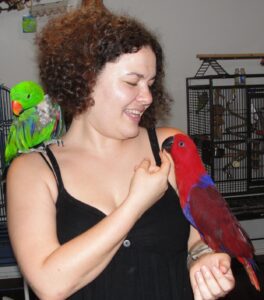Episode #121 - Try it: Learn Your Pet's Ladder of De-Escalation
Helping your pet downshift from stress starts with knowing what it looks like.
June 30, 2025
TLDL (Too Long, Didn’t Listen):
1️⃣ The Ladder of De-Escalation Matters – Understanding how your pet moves down from stress is just as important as knowing how they go up.
2️⃣ Six-Step Observation Process – Learn six steps to better observe and interpret your pet’s body language.
3️⃣ Film and Repeat – Every animal is different, and context matters. Filming and revisiting behavior helps you learn about your pet and what’s consistent and what changes.
Episode Overview:
We talk a lot about recognizing when our pets are becoming more stressed. But what about when they’re calming down? In this episode of Enrichment for the Real World, Emily Strong walks you through a practical and insightful skill: identifying your pet’s ladder of de-escalation. It’s the crucial flip side to recognizing escalation, and it is just as important for supporting your pet’s full stress recovery.
Emily breaks down a six-step process to help you recognize when your pet is moving toward relaxation and how to tell the difference between “just coping” and “truly relaxed.” From self-soothing behaviors to the difference between “resting” and really resting, this episode is filled with tips, common mistakes to avoid, and why you should absolutely film your dog sometimes.
Links & Resources from the Episode
🧾 For full episode transcripts: Arial l OpenDyslexic
🎧 #120 – Why Your Pet Needs a Safe Space (and How to Make One)
Going Down a Rabbit Hole?
Dive deeper into the world of enrichment, behavior, and building harmony.
More from Pet Harmony
We've got a lot more to share -- join the conversation!
Follow us on social media:
Instagram: @petharmonytraining
Facebook: @petharmonytraining
For professionals dedicated to enriching the lives of pets and people alike:
Instagram: @petharmonypro
TikTok: @petharmonypro
Sign up for our weekly newsletter: https://petharmonytraining.com/join/
Subscribe & Review
If this episode resonated with you, we’d love for you to subscribe and leave a review on Apple Podcasts. Your feedback helps us connect with others who are ready to create positive change in their pets’ lives and their own.
Meet the Hosts

Allie Bender, CDBC, CPDT-KA, SBA
Allie Bender is a Certified Dog Behavior Consultant, Certified Professional Dog Trainer- Knowledge Assessed, and a Shelter Behavior Affiliate. She has been in the animal welfare industry since 2006 and professionally training since 2012. She is the founder and co-owner of Pet Harmony, co-author of Canine Enrichment for the Real World, and a national speaker.
While in the animal sheltering industry, Allie realized that her passion lied in helping pets with maladaptive behaviors. Specifically, she wanted to help prevent animals with rehabilitatable problems from being euthanized. She loves working with dogs and cats displaying stranger danger, resource guarding, and leash reactivity. Her favorite thing about working with pets and their people is seeing relationships grow and seeing harmonious households develop.

EMIly strong, CDBC
Emily Strong is a Certified Dog Behavior Consultant and Shelter Behavior Affiliate. She has been in the animal welfare industry since 1990 and has been a behavior consultant since 2008. She is the co-owner of Pet Harmony, co-author of Canine Enrichment for the Real World, and a national speaker.
Emily started working with animals at a young age and struggled with the notion that you have to hurt, scare, or intimidate animals to help them. When she discovered the behavior sciences and learned that it wasn’t necessary to do so– that we can care for emotional, mental, and physical health simultaneously– she plunged headfirst into animal behavior. Emily loves helping current and prospective behavior professionals and working with pet parents through our in-depth services. She enjoys working with all species.
Copyright 2025 Pet Harmony, LLC. All Rights Reserved.
Terms & Conditions, Privacy Policy
Results are not guaranteed because behavior, human, canine, or otherwise, are not guaranteeable.


